Healthcare Disruptors
The Healthcare Disruptors podcast celebrates those who dare to reshape the medical landscape through innovation, bold ideas, and transformative solutions to improve patient care and physician wellbeing. This show is hosted by Ohad Arazi, CEO of Clarius Mobile Health. For more information about Clarius, visit www.Clarius.com
Episodes

Thursday Feb 27, 2025
Thursday Feb 27, 2025
What if predicting human performance was as precise as a Swiss watch? Dr. Philip Skiba, Medical Director of Sports Medicine at Jefferson Health, is proving it's possible, using mathematical modeling to forecast Olympic victories and marathon records with uncanny accuracy. Dr. Skiba tells Ohad how his work with elite athletes and on Nike's Breaking2 project is informing a new approach to personalized medicine.
Dr. Skiba also touches on how combining mathematical modeling with physiological data has helped Olympic athletes achieve gold medals, and why these same principles could transform healthcare delivery. The conversation explores the importance of measuring the right variables, the role of technology in healthcare innovation, and why sometimes the simplest solutions yield the most impressive results.
Topics discussed:
Transforming athletic performance through mathematical modeling and personalized physiological analysis to optimize training and recovery outcomes.
Leveraging wearable technology and real-time data collection to monitor and adjust training programs for athletes across different locations.
Applying elite sports performance principles to broader healthcare delivery and patient care optimization strategies.
Addressing healthcare system challenges through long-term thinking and innovative approaches to patient care delivery.
Breaking down silos in healthcare by bringing together diverse expertise from different fields to solve complex problems.
Balancing technology innovation with practical, simple solutions that directly address core patient needs.
Developing personalized treatment approaches based on individual patient responses and recovery patterns.
Creating sustainable healthcare innovation through strategic leadership and long-term investment in new approaches.
Implementing data-driven decision making while maintaining focus on fundamental patient care principles.
Building collaborative relationships between healthcare providers and technology developers to drive meaningful innovation.
Listen to more episodes:
Apple
Spotify
YouTube
Website
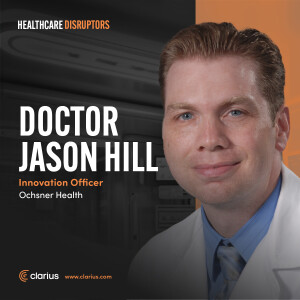
Thursday Feb 13, 2025
Thursday Feb 13, 2025
Treating high blood pressure can take 12 months, but at Ochsner Health, Innovation Officer Dr. Jason Hill has cut that to 6 weeks through digital medicine and transformation. Dr. Hill discusses Ochsner's groundbreaking digital medicine program, which achieves blood pressure control 10x faster than traditional care models.
He also walks Ohad through the critical intersection of technology and clinical practice, the importance of solving the right problems in healthcare innovation, and why patient empowerment is key to addressing the physician shortage crisis. The latest conversation on Healthcare Disruptors offers valuable insights for healthcare leaders and entrepreneurs about scaling innovation while maintaining clinical excellence.
Topics discussed:
How digital medicine programs achieve remarkable outcomes in chronic condition management through patient engagement and algorithm-driven care protocols.
Transforming traditional healthcare delivery models by empowering patients with technology and democratizing medical knowledge.
Implementing AI solutions in clinical workflows while ensuring focus on solving the right problems and maintaining quality care.
Scaling healthcare innovations from pilot to system-wide implementation while navigating clinical, technical, and organizational challenges.
Addressing physician shortages through innovative care delivery models and technology-enabled team-based approaches.
Creating more equitable healthcare access through digital solutions that work better for underserved populations.
Balancing clinical excellence with innovation adoption in healthcare system transformation.
Leveraging behavioral science and patient engagement to improve healthcare outcomes and adherence.
Building collaborative ecosystems between healthcare providers, technology companies, and startups to solve complex challenges.
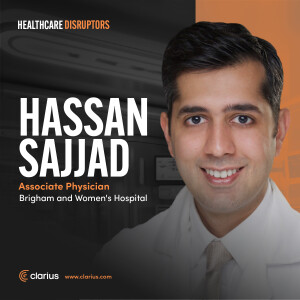
Thursday Jan 16, 2025
Thursday Jan 16, 2025
Dr. Hassan Sajjad, Associate Physician, Brigham and Women’s Hospital joins Ohad to discuss the evolution of value-based care and technology's role in transforming healthcare delivery. Drawing from his extensive critical care experience, Dr. Sajjad explores how portable imaging solutions and AI are revolutionizing bedside care.
Dr. Sajjad also emphasizes the importance of measuring meaningful outcomes — those that matter to patients — while maintaining clinical efficiency. The conversation covers the challenges and opportunities in implementing value-based care models, the impact of emerging technologies, and the crucial partnership between healthcare providers and technology innovators.
Topics discussed:
How value-based care models are transforming healthcare delivery, from fee-for-service to outcome-based payments, all while addressing implementation challenges in different clinical settings.
Quality metrics in healthcare, focusing on measurable outcomes that matter to patients while maintaining clinical efficiency and standards.
How portable imaging technologies are revolutionizing ICU care by enabling bedside diagnostics, reducing patient transport risks and improving clinical decision-making.
AI's expanding role in healthcare, from automating documentation to enhancing clinical decisions through predictive analytics and faster image interpretation.
How technology platforms are improving patient engagement through better communication, monitoring, and coordination between providers and patients across care settings.
The crucial relationship between healthcare providers and technology innovators in developing solutions that address real clinical needs and improve patient care.
Emerging trends in healthcare innovation, including how new technologies and care delivery models are reshaping bedside care and clinical workflows.
Integrating digital health solutions and remote monitoring technologies to enhance patient care and enable more effective healthcare delivery.
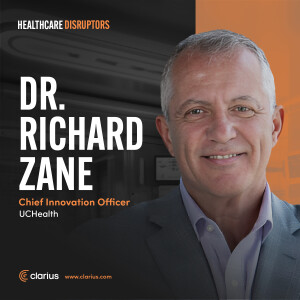
Friday Dec 20, 2024
Friday Dec 20, 2024
In this episode of Healthcare Disruptors, Dr. Richard Zane, Chief Innovation Officer at UCHealth, joins Ohad to share his unique approach to driving innovation in healthcare. He emphasizes the importance of understanding frontline challenges before developing solutions, ensuring that new technologies address real problems.
Dr. Zane discusses the value of rapid decision-making and how eliminating bureaucratic hurdles can enhance operational efficiency. He also highlights the significance of collaboration with startups to create scalable solutions that improve patient care. Tune in to learn how these strategies can transform the healthcare landscape and foster meaningful advancements in the industry!
Topics discussed:
Understanding frontline challenges in healthcare before developing innovative solutions that truly address the needs of providers and patients.
Rapid decision-making in healthcare innovation that allows for swift implementation of effective solutions without getting bogged down by bureaucracy.
How collaboration with startups can lead to the development of scalable solutions that enhance patient care and improve clinical workflows in healthcare systems.
How problem statements guide innovation efforts, ensuring that new technologies are aligned with the specific needs of healthcare providers.
Strategies for fostering a culture of innovation within healthcare organizations, emphasizing the need for agility and responsiveness to industry changes.
Integrating technology that reduces complexity and cost, rather than adding layers of difficulty to existing healthcare processes.
The evaluation process for new technologies, including the importance of leadership involvement and thorough assessments of potential partnerships.
Creating a supportive environment for innovation, including dedicated resources for finance and legal considerations in healthcare ventures.
Focusing on user experience and ensuring that new technologies make healthcare providers' lives easier, rather than complicating their workflows.
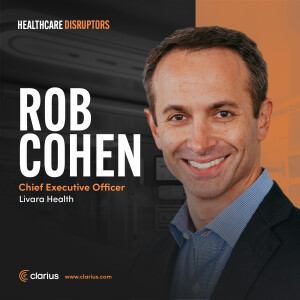
Friday Nov 08, 2024
Friday Nov 08, 2024
In this episode, Ohad speaks to Rob Cohen, CEO at Livara Health, who brings his insights on the transformative potential of value-based care in the healthcare landscape, particularly within the musculoskeletal (MSK) space. He discusses how Livara's innovative model not only enhances patient outcomes but also reduces unnecessary surgeries and healthcare costs.
Rob emphasizes the critical role of technology in improving patient engagement, highlighting the use of virtual platforms and AI-driven analytics to connect patients with specialists. He also touches on how aligning incentives between payers and providers can revolutionize healthcare delivery and empower patients to take charge of their health journey.
Topics discussed:
The shift from fee-for-service to value-based care and its impact on patient outcomes and healthcare costs in the musculoskeletal space.
How Livara Health's innovative model helps avoid unnecessary surgeries while ensuring patients receive the appropriate care for their musculoskeletal conditions.
The importance of technology in enhancing patient engagement and streamlining communication between patients and healthcare providers in the MSK field.
Leveraging AI-driven analytics to risk stratify patients and personalize care plans based on historical outcomes and individual patient data.
The role of virtual platforms in providing timely access to specialists and reducing wait times for patients seeking musculoskeletal care.
Aligning incentives between payers and providers to create a more efficient and effective healthcare delivery system focused on patient well-being.
The challenges of navigating state-by-state licensing laws for telehealth and virtual care providers in the U.S. healthcare system.
The significance of holistic care approaches that address not only physical health but also psychosocial factors affecting musculoskeletal conditions.
Insights on the evolving landscape of healthcare entrepreneurship and the importance of mission-driven companies in tackling industry challenges.
Resources Mentioned:
Rob Cohen on LinkedIn
Livara Health website
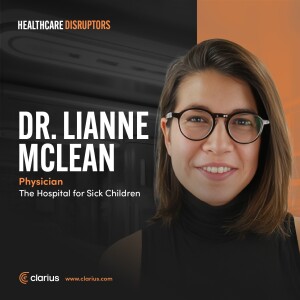
Thursday Oct 03, 2024
Thursday Oct 03, 2024
In this episode, Ohad Arazi speaks to Dr. Lianne McLean, Physician at The Hospital for Sick Children, shares her insights on the vital role of mentorship and sponsorship in shaping healthcare careers. She discusses how technology, particularly AI, is revolutionizing pediatric care by streamlining processes and enhancing decision-making.
Dr. McLean also emphasizes the importance of collaboration between tech developers and healthcare providers to ensure that innovations meet real clinical needs. Together, they explore how these elements can improve patient outcomes and transform the future of healthcare.
Topics discussed:
How mentorship and sponsorship are crucial for guiding emerging healthcare professionals and shaping their career paths effectively.
How technology, particularly AI, is transforming pediatric care by streamlining processes and enhancing clinical decision-making.
The need for collaboration between tech developers and healthcare providers to create solutions that address real clinical needs.
How point of care ultrasound has been a consistent thread in Dr. McLean's career and its impact on practice.
The importance of improving access to care through technology and innovative practices, particularly in pediatric emergency settings.
How integrating new data points into clinical practice can enhance diagnostic and treatment decisions in healthcare.
The significance of involving patient representatives in research to ensure that solutions are relevant and beneficial to end-users.
The unique challenges faced in pediatric research, including recruitment and the need for robust data to support new initiatives.
The importance of building strong relationships within healthcare teams and across disciplines is highlighted as essential for successful collaboration and innovation.

Thursday Sep 19, 2024
Thursday Sep 19, 2024
In this episode, Ohad Arazi speaks with Amanda Cherpak, Director of Clinical Medical Physics at Nova Scotia Health Authority, to explore her career journey and the pivotal role of mentorship in healthcare. Amanda shares her insights on the transformative impact of artificial intelligence, emphasizing its potential to enhance efficiency and accuracy in patient care.
Additionally, she discusses the importance of prioritizing patient-centered care as the industry evolves, ensuring that technological advancements serve the needs of individuals.
Topics discussed:
How mentorship can significantly influence a career trajectory via guidance and opening doors to new opportunities in healthcare.
The transformative potential of artificial intelligence in medical imaging, improving efficiency, accuracy, and overall patient outcomes.
The importance of keeping the patient at the forefront of healthcare innovations, ensuring that technology enhances the patient experience.
The complexities and challenges faced in the medical imaging field, including technological integration and patient management.
The importance of interdisciplinary collaboration in healthcare and how diverse perspectives can lead to better solutions and innovations.
The need to balance technological advancements with compassionate patient care, ensuring that human elements remain integral to healthcare.
The significance of education and continuous training for healthcare professionals to keep pace with rapid technological changes in the field.
Resources Mentioned: Amanda Cherpak on LinkedIn
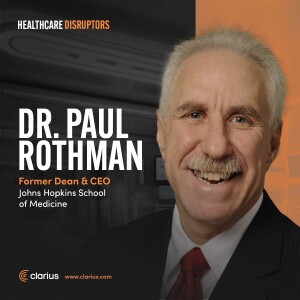
Thursday Sep 05, 2024
Thursday Sep 05, 2024
In this episode, Ohad speaks with Dr. Paul Rothman, Former Dean & CEO, Johns Hopkins School of Medicine. They reflect on the vital role of mentorship in shaping healthcare careers, emphasizing the importance of both seeking and providing guidance, even in our modern, tech-centered age.
Dr. Rothman discusses the transformative impact of data and artificial intelligence in improving patient care and operational efficiency. He also addresses the challenges of the hybrid workplace for young professionals, advocating for innovative learning opportunities to ensure their growth in a rapidly evolving healthcare landscape.
Topics discussed:
How mentorship shapes careers in healthcare, including the reciprocal benefits of guiding and being guided by others.
How leveraging data can lead to informed decision-making, ultimately improving patient outcomes and enhancing healthcare delivery.
The potential of AI to streamline processes, assist in diagnostics, and enhance the overall patient experience.
The difficulties young professionals face in a hybrid work environment, particularly in establishing meaningful mentorship relationships.
The value of traditional learning experiences, such as observing mentors in action, which can be diminished in remote settings.
Transitioning from clinical practice to leadership roles, particularly the importance of adaptability and continuous learning.
The future landscape of healthcare, driven by technological advancements and changing patient needs.
The importance of fostering a focus on patient-centered approaches, ensuring that healthcare systems prioritize the needs and experiences of patients.
The necessity of collaboration among healthcare professionals to foster innovation and improve overall healthcare delivery.
Resources Mentioned:
The Industries of the Future by Alec Ross
The AI Revolution in Medicine by Peter Lee, Carey Goldberg, & Isaac Kohane
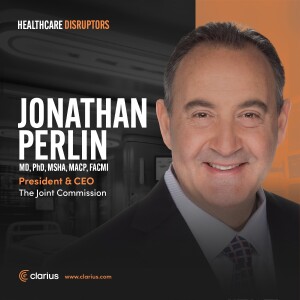
Thursday Aug 22, 2024
Thursday Aug 22, 2024
In this episode, Ohad speaks with Jonathan Perlin, MD, PhD, MSHA, MACP, FACMI, President & CEO of The Joint Commission. They explore the critical intersection of healthcare technology and quality improvement, emphasizing the need for a rational business case to drive technology adoption.
Dr. Perlin highlights the importance of streamlined performance measures to reduce reporting burdens and enhance patient care. He also touches on the transformative role of AI in healthcare, particularly in improving diagnostic support and workflow efficiency.
Topics discussed:
The importance of aligning healthcare technology with quality objectives to enhance patient outcomes and operational efficiency.
The necessity of creating a rational business case for adopting new technologies, anchored in quality improvement metrics.
How streamlined performance measures reduce the reporting burden on healthcare providers, allowing them to focus more on patient care.
The transformative potential of AI in healthcare is explored, particularly in enhancing diagnostic support and reducing administrative burdens.
The critical workforce issues facing healthcare organizations, including recruitment and retention, which impact overall service delivery.
The growing demand from younger workers for organizations to demonstrate a commitment to sustainability and social responsibility.
Eliminating redundant and obsolete standards within healthcare to streamline processes and improve operational effectiveness.
The importance of engaging stakeholders in the quality improvement process is emphasized, ensuring that their voices are heard and considered.
Why leaders should understand and advocate for the quality measures promoted by the Joint Commission as part of their business strategy.

Thursday Aug 08, 2024
Thursday Aug 08, 2024
In this episode, Ohad speaks with Rishi Manchanda, MD, MPH, Founder & CEO of HealthBegins, to explore innovative approaches to healthcare. Dr. Manchanda dives into the importance of addressing social determinants of health, such as food insecurity and housing instability, to improve care for underserved populations.
Dr. Manchanda highlights the transformative role of data and technology, particularly geolocation, in creating targeted healthcare solutions. He also shares actionable strategies for providers and tech companies to promote social justice and equity in healthcare.
Topics discussed:
The role of social determinants like food insecurity and housing instability in shaping health outcomes for underserved populations.
Innovative care models that address broader social issues to improve healthcare delivery and patient well-being.
The importance of leveraging data, especially geolocation, to identify and address community-specific healthcare needs.
Strategies for integrating social justice principles into healthcare practices and policies.
How technology can facilitate a more open exchange of information between healthcare providers and patients.
The influence of political and social environments on global health issues.
The intersection of healthcare and policy, and how policy choices impact health outcomes.
Actionable advice for providers and tech companies to drive equity and better health outcomes.
The role of interdisciplinary approaches in connecting healthcare practices with broader social contexts.
Opportunities for medtech companies to innovate and address healthcare inequities through targeted solutions and data analysis.

